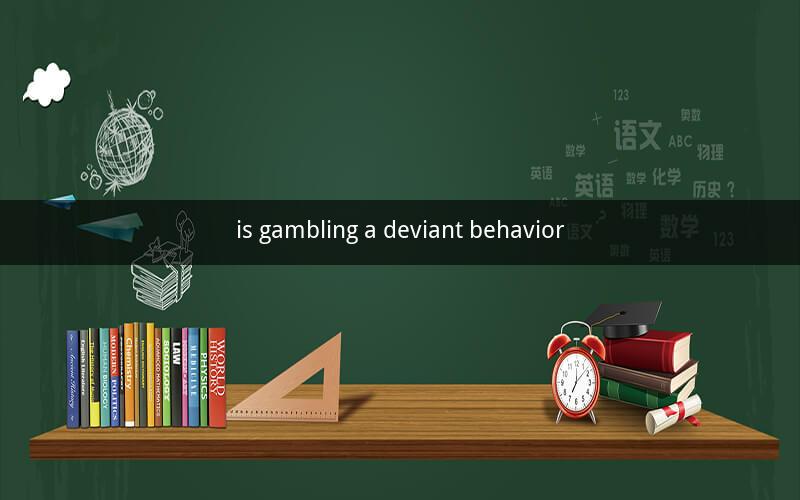
Table of Contents
1. Introduction
2. Definition of Deviant Behavior
3. Types of Gambling
4. Social and Psychological Consequences of Gambling
5. Legal Implications of Gambling
6. Public Policy and Regulation
7. Societal Perception of Gambling
8. Conclusion
9. Frequently Asked Questions
1. Introduction
Gambling has been a subject of debate for centuries, with various societies having different views on its nature. One such debate revolves around whether gambling is considered a deviant behavior. In this article, we will explore the definition of deviant behavior, different types of gambling, the social and psychological consequences, legal implications, public policy and regulation, and societal perception of gambling.
2. Definition of Deviant Behavior
Deviant behavior refers to actions that deviate from societal norms and values. These actions can range from minor infractions to severe violations, and they often result in sanctions or punishment from the society. Some examples of deviant behavior include theft, fraud, and substance abuse.
3. Types of Gambling
Gambling can take various forms, including lottery, sports betting, poker, and casino games. Each type has its own set of rules, odds, and potential rewards.
3.1 Lottery
Lottery is a form of gambling where players purchase tickets with the hope of winning a prize. The prizes are usually based on the number of players and the total amount of money collected from ticket sales.
3.2 Sports Betting
Sports betting involves placing bets on the outcome of various sporting events. This type of gambling is popular among sports enthusiasts who enjoy predicting the results of games or races.
3.3 Poker
Poker is a card game that requires skill, strategy, and luck. It is often played in casinos or among friends, and players can bet on the value of their hands or the hands of others.
3.4 Casino Games
Casino games include slot machines, blackjack, roulette, and baccarat. These games are designed to provide entertainment and the opportunity to win money, but they often have a high house edge.
4. Social and Psychological Consequences of Gambling
Gambling can have significant social and psychological consequences, particularly when it becomes excessive or compulsive.
4.1 Social Consequences
Gambling addiction can lead to financial difficulties, strained relationships, and even homelessness. In addition, gambling-related crimes, such as theft and fraud, can also have a negative impact on society.
4.2 Psychological Consequences
Compulsive gambling can lead to mental health issues such as depression, anxiety, and substance abuse. It can also cause individuals to develop coping mechanisms, such as isolation and secrecy, which can exacerbate their addiction.
5. Legal Implications of Gambling
The legal status of gambling varies by country and region, with some allowing it, others prohibiting it, and still others regulating it.
5.1 Prohibited Gambling
In some countries, such as North Korea and Saudi Arabia, gambling is strictly prohibited. In these cases, individuals caught gambling can face severe penalties, including imprisonment or even death.
5.2 Regulated Gambling
Many countries regulate gambling, imposing strict rules and regulations on operators and players. This includes age restrictions, minimum betting limits, and the requirement to obtain a license.
5.3 Legalized Gambling
In some countries, such as the United States and the United Kingdom, gambling is legal and regulated. This allows operators to provide services within certain guidelines and ensures that players are protected from fraudulent activities.
6. Public Policy and Regulation
Public policy and regulation play a crucial role in managing the risks associated with gambling.
6.1 Education and Awareness
Governments can implement educational programs to raise awareness about the risks of gambling addiction and promote responsible gambling habits.
6.2 Licensing and Oversight
Regulatory bodies can issue licenses to gambling operators and oversee their activities to ensure compliance with the law and protect consumers.
6.3 Treatment and Support
Governments can fund and provide access to treatment and support services for individuals struggling with gambling addiction.
7. Societal Perception of Gambling
The societal perception of gambling varies greatly, with some people viewing it as a harmless form of entertainment, while others see it as a dangerous addiction.
7.1 Proponents of Gambling
Proponents argue that gambling can provide a source of revenue for governments, create jobs, and contribute to the economy. They also claim that responsible gambling can be an enjoyable pastime for many people.
7.2 Critics of Gambling
Critics argue that gambling can lead to addiction, financial hardship, and other negative consequences. They believe that stricter regulations and controls are necessary to protect individuals and society from the dangers of gambling.
8. Conclusion
Is gambling a deviant behavior? The answer to this question is complex and depends on various factors, including the context, the severity of the gambling behavior, and the societal norms and values of the particular community. While some may argue that gambling is a deviant behavior due to its potential for harm and addiction, others may view it as a form of entertainment and a source of revenue. Ultimately, the debate surrounding gambling continues, and it is essential for societies to consider the risks and benefits associated with this activity.
Frequently Asked Questions
1. What is the definition of deviant behavior?
2. What are the different types of gambling?
3. What are the social consequences of gambling addiction?
4. What are the psychological consequences of gambling addiction?
5. How does the legal status of gambling vary by country?
6. What is the role of public policy and regulation in managing the risks of gambling?
7. What is the societal perception of gambling?
8. What are the risks associated with gambling addiction?
9. How can governments raise awareness about the risks of gambling addiction?
10. What treatment and support services are available for individuals struggling with gambling addiction?